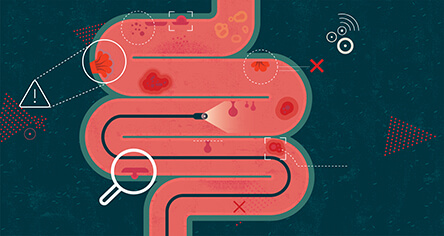
SYMPTOM RELIEF
Symptom relief is important, but it's not the whole story in Inflammatory Bowel Disease (IBD).
Learn about endoscopic improvement and work with your gastroenterologist to address underlying inflammation.
ELEVATE YOUR IBD GOALS
Understanding IBD beyond the symptoms

Inflammatory Bowel Disease (IBD), which includes Crohn’s disease (CD) and ulcerative colitis (UC), is more than just symptoms—it’s a group of diseases associated with ongoing inflammation in the digestive tract.1

SYMPTOM MANAGEMENT
Symptom management is important—but it does not change the course of IBD.2-4

UNDERLYING INFLAMMATION
Some disease management options can help relieve IBD symptoms but may not address the underlying inflammation associated with IBD, which can lead to increased risk of flares.

INTESTINAL DAMAGE
Even in clinical remission, when IBD symptoms are under control, inflammation can continue due to persistent inflammation from prior intestinal damage.4-6

ENDOSCOPIC IMPROVEMENT
Patients should speak with their gastroenterologist about long-term goals—such as the visible improvement of the intestinal lining.
IBD GOALS
It’s time to elevate your IBD goals, building from symptom management to
long-term endoscopic improvement.
Prioritize goals like:

Reducing Inflammation

Reducing Damage to the Intestinal Lining

Improving Overall Health
Patients and providers can work
together to achieve better outcomes.

UNDERSTANDING IBD
An overview of IBD and its impact

An inappropriate inflammatory response in the immune system causes damage to the mucosa of the gut. This inflammation of the mucosa is associated with IBD symptoms like abdominal pain, diarrhea, and rectal bleeding.7-9

CD is a chronic inflammation of the digestive tract that can affect any part of the gastrointestinal tract, from the mouth to the anus, but most often involves the small intestine and colon.7,10

UC is a type of IBD characterized by chronic inflammation and ulcerations in the lining of the large intestine (colon) and rectum.11-13


ENDOSCOPIC IMPROVEMENT
is the visible improvement of the lining of the intestinal tract from the damage caused by IBD.
It may be an indicator for meeting your long-term treatment goals.14
Long-Term Goals, Not Just Short-Term Relief
Focusing on long-term improvements can help with overall IBD management.

REDUCING DISEASE PROGRESSION
Delayed diagnosis, untreated or inadequately managed IBD, and complications of CD and UC can result in persistent inflammation and more severe disease that may cause further bowel damage, leading to potential need for surgery or a higher risk of developing colorectal cancer.1,13,14

SETTING TREATMENT GOALS
The visible improvement of the intestinal lining from the damage caused by IBD may lead to better health outcomes, including fewer hospitalizations, reduced need for steroids, better IBD symptom control, fewer surgeries, and lower risk of colon cancer.15,16

IMPACT ON
DAILY LIFE
The uncertainty of when the next flare will arise or how severe it could be can potentially impact work, social activities, intimate relationships, and other aspects of daily life. Achieving symptom relief, coupled with addressing underlying inflammation to achieve clinical remission and endoscopic improvement, are key steps toward long-term management in IBD.15,17
You're Not Alone: Inspiration From the IBD Community.
Ambassador Spotlight
Actor Tyler James Williams is living with IBD and, as the ambassador for Beyond a Gut Feeling, is partnering with AbbVie to share his story to inspire others to advocate for themselves, ask questions, and partner with their gastroenterologist to help achieve their long-term goals.
Your Voice, Your Health
Partnering With Your Doctor to Achieve Your IBD Goals
Work closely with your doctor to set goals and create a plan that works for you to go beyond a gut feeling, focusing on IBD symptom management as well as endoscopic improvement.


Management options for IBD have recently evolved from symptom relief to also include endoscopic improvement. Talk to your gastroenterologist about an IBD management plan and follow up regularly.1,7,18

Your gastroenterologist can assess your current status through procedures like a colonoscopy or endoscopy, which allow them to visually examine your intestinal lining. Regular monitoring helps track your progress toward this important goal.

Ask your doctor if your IBD management plan takes into consideration the latest evidence- and consensus-based recommendations from expert medical organizations. In 2021, the International Organization for the Study of IBD STRIDE-II (Selecting Therapeutic Targets in IBD) Initiative published an update on selecting therapeutic targets in IBD.15

Elevate Your IBD Goals: Take the Next Step
It's time to elevate your IBD goals, building from symptom management to include long-term endoscopic improvement. Talk to your doctor about how to create an IBD management plan to help strive for endoscopic improvement.
References
1. CDC. Inflammatory Bowel Disease (IBD). https://www.cdc.gov/inflammatory-bowel-disease/living-with/index.html
2. Colombel JF, Narula N, Peyrin-Biroulet L. Management strategies to improve outcomes of patients with inflammatory bowel diseases. Gastroenterology. 2017;152(2):351-361.e5. doi:10.1053/j.gastro.2016.09.046
3. Shah SC, Colombel JF, Sands BE, Narula N. Systematic review with meta-analysis: mucosal healing is associated with improved long-term outcomes in Crohn’s disease. Aliment Pharmacol Ther. 2016;43(3):317-333. doi:10.1111/apt.13475
4. Baars JE, Nuij VJAA, Oldenburg B, Kuipers EJ, van der Woude CJ. Majority of patients with inflammatory bowel disease in clinical remission have mucosal inflammation. Inflamm Bowel Dis. 2012;18(9):1634-1640. doi:10.1002/ibd.21925
5. Crohn’s & Colitis Foundation. Partnering with your doctor. https://www.crohnscolitisfoundation.org/patientsandcaregivers/effective-partnering
6. Otte ML, Tamang RL, Papapanagiotou J, Ahmad R, Dhawan P, Singh AB. Mucosal healing and inflammatory bowel disease: therapeutic implications and new targets. World J Gastroenterol. 2023;29(7):1157-1172. doi:10.3748/wjg.v29.i7.1157
7. Crohn’s & Colitis Foundation. The facts about inflammatory bowel diseases. Published November 2014. https://www.crohnscolitisfoundation.org/sites/default/files/2019-02/Updated IBD Factbook.pdf
8. Crohn’s & Colitis Foundation. Overview of Crohn’s disease. https://www.crohnscolitisfoundation.org/what-is-crohns-disease/overview
9. National Institute of Diabetes and Digestive and Kidney Diseases. Ulcerative colitis. https://www.niddk.nih.gov/health-information/digestive-diseases/ulcerative-colitis
10. Mayo Clinic. Crohn’s disease - symptoms and causes. https://www.mayoclinic.org/diseases-conditions/crohns-disease/symptoms-causes/syc-20353304
11. Gajendran M, Loganathan P, Jimenez G, et al. A comprehensive review and update on ulcerative colitis. Dis Mon. 2019;65(12):100851. doi:10.1016/j.disamonth.2019.02.004
12. Monstad I, Hovde O, Solberg IC, Moum BA. Clinical course and prognosis in ulcerative colitis: results from population-based and observational studies. Ann Gastroenterol. 2014;27(2):95-104.
13. Mehta F. Report: Economic Implications of inflammatory bowel disease and its management. Am J Manag Care. 2016;22(3 suppl):s51-60.
14. Neurath MF. New targets for mucosal healing and therapy in inflammatory bowel diseases. Mucosal Immunol. 2014 Jan;7(1):6-19. doi: 10.1038/mi.2013.73
15. Turner D, Ricciuto A, Lewis A, et al. STRIDE-II: an update on the Selecting Therapeutic Targets in Inflammatory Bowel Disease (STRIDE) initiative of the International Organization for the Study of IBD (IOIBD): determining therapeutic goals for treat-to-target strategies in IBD. Gastroenterology. 2021;160(5):1570-1583. doi:10.1053/j.gastro.2020.12.03
16. Shah SC, Itzkowitz SH. Colorectal cancer in inflammatory bowel disease: mechanisms and management. Gastroenterology. 2022;162(3):715-730.e3. doi:10.1053/j.gastro.2021.10.035
17. Lönnfors S, Vermeire S, Greco M, Hommes D, Bell C, Avedano L. IBD and health-related quality of life — discovering the true impact. J Crohns Colitis. 2014;8(10):1281-1286. doi:10.1016/j.crohns.2014.03.005
18. Dave M, Loftus EV. Mucosal healing in inflammatory bowel disease—a true paradigm of success? Gastroenterol Hepatol (N Y). 2012;8(1):29-38.